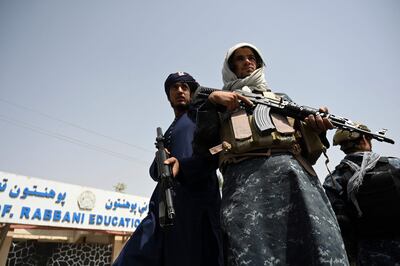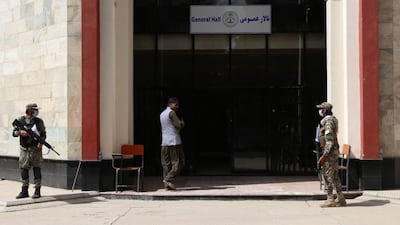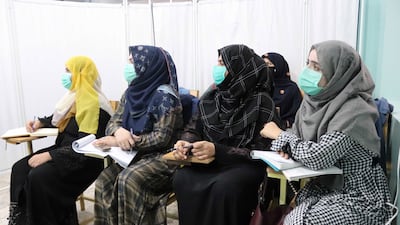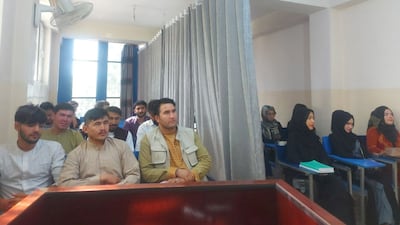Public universities in Afghanistan have not opened their doors for their students since four months leaving thousands of young men and women in the dark about their future.
Ahmadullah Khalid, 23, from Paktia province, was in his final year at the Faculty of Islamic Law in Kandahar University. But now, like many of his classmates, he has been waiting anxiously in his home province.
The Taliban took control of Afghanistan on August 15 this year, marking the collapse of the US-backed government. With the sudden fall of the government in Kabul, functions of all sectors, including in education, abruptly stopped.
Schools and universities across the country were closed once again after they had resumed for a short time following a long break caused previously by the Covid-19 outbreak.
In mid-September, primary schools and private universities resumed classes but public universities have not reopened yet.
“The doors of public universities had been shut down for months due to Covid-19,” Khalid told The National. “After the Taliban’s takeover, it is the fourth month now, and universities are still closed.”
He also mentioned the uncertainty about when universities will reopen and the overall devastating economic conditions have forced many students to leave Afghanistan for neighbouring countries through illegal means. “Students have become hopeless,” Khalid said.
“The future looks dark. Empty promises are not helping any more. The current government needs to take practical steps to reopen public universities without further delays.”
Officials at the Ministry of Higher Education say the main reasons for not reopening public universities include the lack of financial resources and the intended amendments of the previous curriculum.
“The government cannot afford running public hostels and this may cause protests against the government by students,” one Ministry of Higher Education official, who sought anonymity, told The National.
There are 39 public universities and higher education institutes across 24 provinces of Afghanistan and each one has a hostel to accommodate students from other provinces. Hostels also provide food for students.
The Taliban want to include additional religious subjects to the curriculum of various faculties as part of their “Islamisation of education” process.
The group also claim they are working on a mechanism for gender segregation before reopening universities.
Dr Zuhra Faizi, post-doctoral fellow at the Harvard Graduate School of Education, said the government’s inability to pay university professors's salaries could be one of the reasons why public universities had not resumed yet.
According to her, a less opaque explanation is how the Taliban imagine the role of public universities in shaping Afghan society.
Public education systems – whether grade schools or higher education – represent the vision of the state for society. “The Taliban intend to make curricular and perhaps some structural changes, however, their vision is unclear.”
In the meantime, students are falling behind and frustration is growing.

Dr Faizi said the US decision to freeze Afghanistan’s assets overnight exacerbated the problem.
“The international community needs to act now to keep Afghanistan’s universities open. Some of the frozen assets should go directly to paying professors’s salaries.”
She stressed that the new government in Afghanistan must carefully assess the types of changes they intend to make and include the perspectives of university professors, experts, and students in their decision-making processes.
“Universities must have some level of autonomy and academic freedom to prosper. If changes need to be made, they should be made gradually; reopen universities in the meantime to gain public trust.”
The country is already experiencing another brain drain, which will likely have detrimental effects on development and stability.
“To avoid more professionals leaving the country daily, the government must give people hope and clarity,” Dr Faizi said.
The Taliban initially announced that women professors should stay home and will get paid. Associate professor Muzhda Tabesh Noor of Badakhshan University said she occasionally went to the university only to sign the attendance sheet.
Professors from other universities also said they visited their universities once a week to mark their attendance; however, they have not been paid.
“The Ministry of Higher Education sent letters to all universities and instructed them not to perform any academic and administrative work including processing students’ documents,” the 31-year-old woman professor told The National.
Like Ms Noor, professors and associate professors of thousands of public universities have not received their salaries for four months. “It is very difficult for those who do not have any other source of income,” she said.
Ebadurahman Naser, a professor from Laghman University, said he was not satisfied with the current situation of universities.
“As students are not coming to classes and I am not able to do my job as an instructor, I am getting depressed and I feel I am not doing anything,” the 32-year-old said. “I feel very unsettled.”
According to the Afghan Ministry of Higher Education, there are currently close to 180,000 students at the 39 public universities and higher education institutes across the country. About 30 per cent of them are girls.
The future of these students remain uncertain while thousands of graduates are excluded from the workforce as the Taliban are recruiting only their members to most of the vacant positions.









